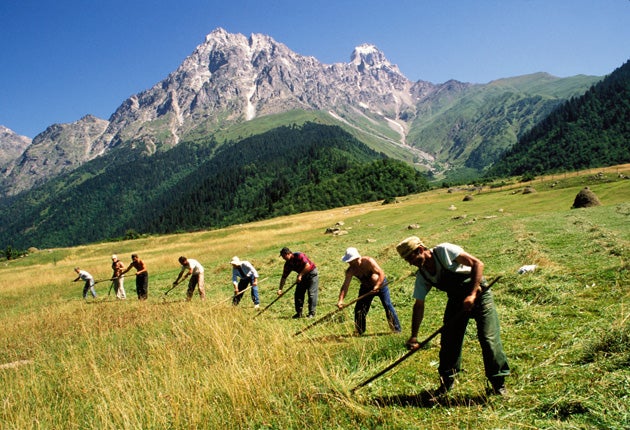Boer farmers head for new home in Georgia
Facing the threat of land reform, white South Africans are looking to pastures new

South Africa and Georgia have little in common aside from a tradition of wine-making and a turbulent recent history. But a group of white South African farmers say starting a new life in the former Soviet state could be the solution to their troubles at home.
South Africa's 40,000 white farmers, mainly Boers – descendants from Dutch settlers – say they fear that South Africa's government is threatening their livelihoods with land-reform policies. When they first came to Africa, the Boer Voortrekkers, or pioneers, left coastal colonies to forge a path to the interior of the country in search of fertile land. Now some of their descendants believe the answer to their problems might lie thousands of miles away in the Caucasus.
In what would be an extraordinary migration, the Georgian government has invited South Africa's farmers to buy up land in the country for next to nothing in exchange for bringing their expertise and knowledge of modern farming methods.
Papuna Davitaya, Georgia's State Minister for Diaspora, said: "We are looking for investors in our agricultural sphere, because Georgia historically always used to be an agricultural country but in Soviet times we lost these traditions."
He welcomed a delegation of South African farmers to the country recently and gave them guarantees about what they could expect if they made the move. "Boers are some of the best farmers in the world," Mr Davitaya said.
Last week, dozens of farmers attended a union meeting in Pretoria about a potential move to Georgia. A committee from the union plans to lay the groundwork in the coming months, and then co-ordinate a larger migration.
Hendrik Mills, a Boer farmer, told ABN television: "I think there are great prospects for farmers out there. It would be much better to invest money in Georgia than in Africa."
For many of the Boer farmers, whose ancestors settled in southern Africa 200 years ago, it would be tough to leave their ancestral homeland. But they say their lives are getting harder every month, citing fears of crime, violence, labour costs and land reform.
Piet Kemp, who is keen to emigrate, said: "We will start with 10 or 20 farmers, but I think there could be more than 1,000 farmers who could make a good life in Georgia."
Georgia's government hopes that importing farming expertise will boost the country's agricultural and wine sectors. Georgia has produced wine for centuries, but most of it is semi-sweet and not very popular in Europe. Georgian wines were well-liked in Russia but a political dispute between the two countries led to Moscow banning all imports. Georgians will perhaps be hoping that if the scheme works, they will also benefit from some of the success South African wines enjoy.
But adjusting to Georgia might prove tricky for Boer farmers. The Georgian language is hard to learn. And there are no direct flights to Africa from the country. Not only that, but the climates in the two countries are completely different, as are farming methods.
Yet Mr Kemp insisted that he and others were ready to try it. "I don't want to come and make a new South Africa in Georgia," he said. "If I am going, I will be a Georgian."
The idea has its critics in both countries. Georgian opposition politicians claim that the new arrivals are being sold the best land at knock-down prices while Georgian farmers are neglected. In South Africa, there is also unease at the idea of letting some of the country's best farmers leave.
Join our commenting forum
Join thought-provoking conversations, follow other Independent readers and see their replies
Comments
Bookmark popover
Removed from bookmarks